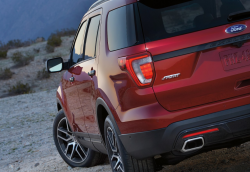
— A Ford Explorer carbon monoxide investigation has been upgraded after the National Highway Traffic Safety Administration (NHTSA) wasn't pleased with Ford response to the investigation.
The original investigation was opened in 2016 and included 2011-2015 Explorers, then expanded in July 2017 to include additional model years. NHTSA says it found additional customer reports related to exhaust odors, along with three crashes and 41 injuries.
Customers complain about symptoms of carbon monoxide poisoning including nausea, headaches and dizziness, but a few people also report losing consciousness while driving.
Ford provided safety regulators with 2,400 owner complaints, legal claims and warranty claims involving 2,051 SUVs, in addition to providing details about Ford's own investigation.
Ford told safety regulators third-party independent researchers investigated the Explorers to measure carbon monoxide levels under different driving conditions. Ford also says technical service bulletins (TSBs) issued to dealers show the repairs helped the SUVs.
Four Explorers were selected for testing and equipped with carbon monoxide detectors on the driver's headrest and the rear third-row driver-side headrest. The SUVs were driven about 40 minutes and included several instances of the throttles wide open.
The first Explorer tested was a complaint vehicle that had been repurchased by Ford, an SUV that had been repaired under a technical service bulletin. Ford says it concluded the SUV didn't register measureable levels of carbon monoxide in the front or rear seats.
The second Explorer tested was a complaint vehicle that had partial TSB repairs performed as there was no underbody sealant or liftgate drain valves installed. This SUV registered a brief CO level of 7 ppm in the rear seating position that quickly dissipated resulting in an average of less than 1 ppm.
The third Explorer tested was a non-complaint vehicle that never had any recommended repairs performed and the SUV had previously been involved in a rear-end collision.
The Explorer also measured a brief maximum CO level of 7 ppm in the rear seating position that quickly dissipated resulting in an average of less than 1 ppm over the duration of the test drive.
The fourth Explorer tested was a non-complaint vehicle that never had any recommended repairs performed and the SUV had previously been involved in a rear-end collision.
This fourth vehicle measured a brief maximum CO level of 16 ppm in the rear seating area that also allegedly quickly dissipated resulting in an average of 4.5 ppm.
Ford says all these CO levels are well below any standards, especially since investigators found only “momentary" levels that quickly disappeared. In addition, when investigators allegedly drove the SUVs without using wide-open throttles, the carbon monoxide levels were zero.
The automaker also says after a beginning spike of complaints, the number of reports steadily declined, allegedly proof that repairs made under technical service bulletins did their job.
As for reports about occupants getting sick from the fumes, Ford says there is no evidence to show exhaust odors or carbon monoxide caused the problems.
Ford concluded to NHTSA the alleged defect shows only a small number of customers are affected by exhaust odors entering the cabins and independent testing shows that amounts of carbon monoxide are below Ford's standards.
In addition to Ford's standards, the carbon monoxide levels are allegedly below all known air quality standards and therefore not harmful to Explorer occupants.
The automaker also says it has taken steps to repair and improve the SUVs that have proven to be very effective.
None of that was apparently impressive to NHTSA because the investigation is now upgraded to an engineering analysis of more than 839,635 model year 2011-2017 Ford Explorers.
CarComplaints.com will update our website with results of the upgraded carbon monoxide investigation.
Read owner-reported complaints about Explorer exhaust systems:




